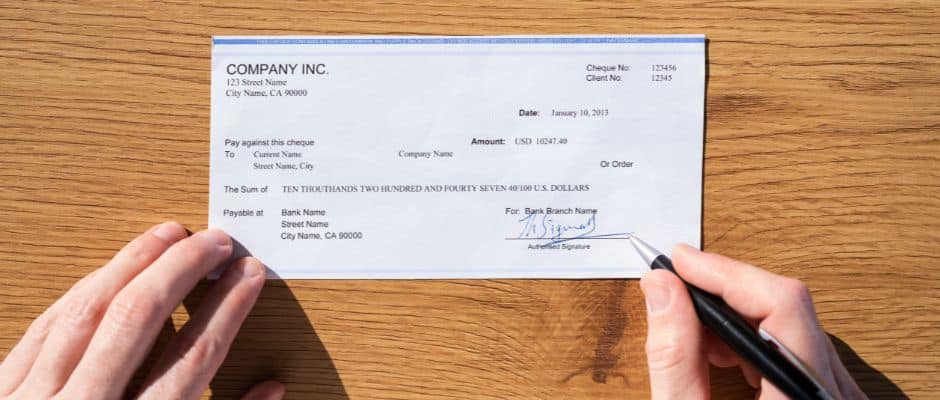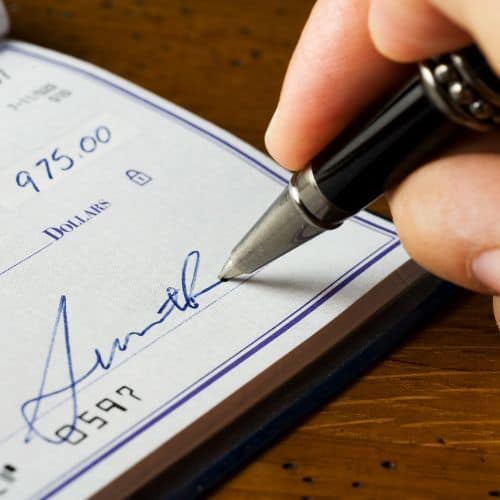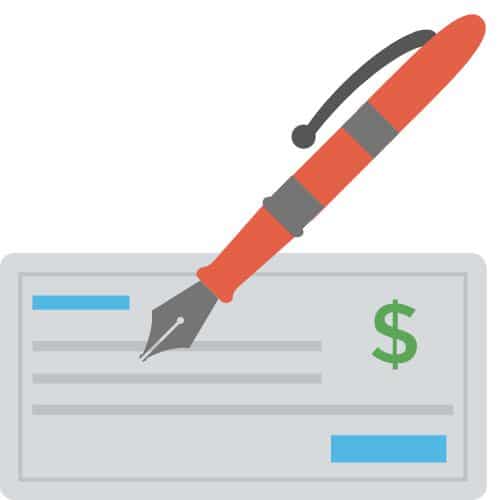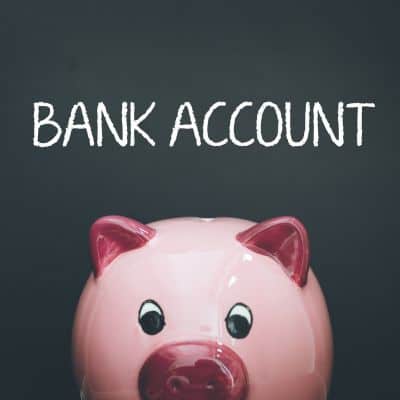
Remember paper checks? Despite a lot of our payments and transactions going digital, there are still a lot of people who write checks. One question I often get asked is: can someone deposit a check for me without my signature?
It’s a great question because these days, a lot of younger people might not know the rules around depositing a check.
To answer the question, yes!
Someone can absolutely deposit a check for you without your signature. There are countless situations where someone else will have to deposit a check on behalf of the payer. Oftentimes there just isn’t an opportunity to get your signature before the check is deposited.
If you’re going to do this, I highly recommend getting somebody trustworthy to do so. For example, if it is for a business, then getting an employee or colleague to do so is generally safe. There are a few things you can do to ensure that the money from the check ends up in your account, and I’ll talk about those in this article!
Can Someone Deposit a Check For Me Without My Signature?
One of the things we’ve always been taught is to sign our checks. Why? Because it endorses the check as legitimate and verifies that you are the proper recipient of the money. It is also a security policy that most banks have in place to ensure that people aren’t trying to deposit a stolen check.
But there are plenty of times when someone else is going to be depositing a check for you. Banks understand this and there are definitely ways to get around not endorsing your check when someone else deposits it. How exactly can you do this? The best way to have someone else deposit your check without your signature is to write FDO on the check, with the account number in the endorsement space.
What does FDO mean? FDO stands for For Deposit Only and the teller will know that the check can only be deposited in the account. This also prevents the person who deposited the check from withdrawing any of the funds in a separate transaction. Hopefully, the person you have tasked with depositing the check is trustworthy so you don’t have to worry about it. Still, you can never be too safe when it comes to money.
What Happens If You Deposit an Unsigned Check?

Even if you yourself are depositing a check, if you haven’t signed the back you do risk getting it rejected at the bank. Some banks follow a strict policy about having the check properly signed. Usually, if you deposit an unsigned check, you’ll get it back or get a call from the bank.
On other occasions, the transaction might be frozen until you can confirm it is your check. But then again, sometimes the bank will go ahead and process it and you’ll never even know about the forgotten signature.
Now if you are receiving a check from someone else and they did not sign the check, you’ll likely have difficulty depositing it. This is a common security measure for most banks. If that person got a hold of your checkbook and wrote themselves a check, nobody would know the difference.
In any case, if you deposit an unsigned check you can expect to raise some red flags at the bank. Whether you do this through a teller or at the ATM, whoever discovers that the check is without a signature will likely raise the alarm. Ultimately the transaction will still probably go through but you may be required to endorse the check before the funds clear.
How to Endorse a Check

With all of this talk about endorsing a check, we might as well review what this even means.
Endorsing a check is the act of signing, or stamping, the back of a check. Most checks will come with a box where you can clearly add your signature. This helps to identify you, the person depositing the check, as the payee whose name is also written on the front of the check.
You can see why people would be confused about being able to deposit someone else’s unsigned check. The signature is used as a primary verification from the payee, so if you aren’t the payee, then why should you be able to deposit those funds?
In the worst-case scenario, if you don’t endorse a check it could get sent back to the issuer of the check. The bank could also choose to charge a fee for a check that wasn’t properly endorsed. Again, this is the worst-case scenario, so most situations will not escalate to this degree.
You might just find that more often than not, the bank will just allow the deposit to take place even if there isn’t an endorsement. It might not be the best answer, but the easiest way to check is to ask your bank what their policies are on unendorsed checks.
The Bottom Line
It might not be a popular way to make transactions these days, but I can assure you that many people still rely on checks. It can be a rent check, a paycheck, or a deposit being paid. No matter what the situation might be, you need to know what your bank’s rules are when it comes to endorsing a check.
If you are relying on someone else to deposit your check for you, no sweat! You can leave a note on the back like the FDO acronym which stands for For Deposit Only. Or, you can just trust the person you are sending to deposit the check and provide them with your own written permission.
Either way, anyone can deposit your check for you without a signature, but don’t be surprised if the bank has some questions if you don’t provide them with any instructions. Thanks for reading!
Geek, out.




![Can Banks Legally Ask Where You Got Your Money? [The Truth]](https://thefinancialgeek.com/wp-content/uploads/2022/08/Featured-Image-37.jpg)

